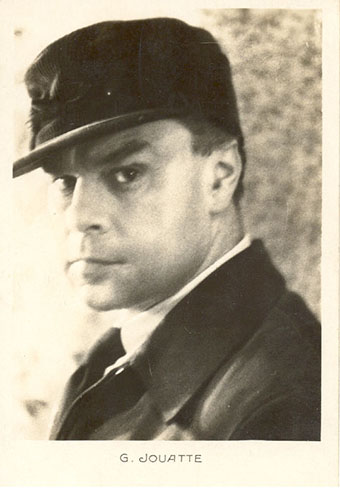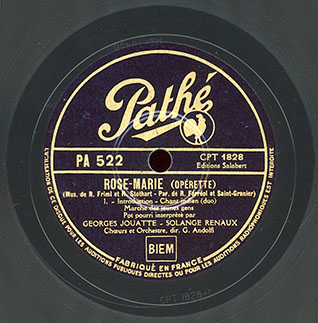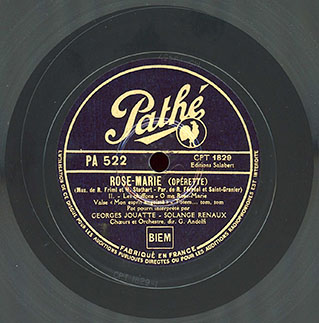Georges Jouatte
17 June 1892 Villefagnan – 13 February 1969 La Rochelle
 |
 |
| Ottavio |
Jouatte was the son of a brewer. To finance his musical education, he appeared as a dancer as the Casino de Paris.
He concluded his vocal studies (as a baritone) in Germany, where he appeared in concert and operetta in Berlin, and even played
a supporting role in the first feature-length German sound film, Das Land ohne Frauen. In 1932, he made his stage debut
at the Théâtre Mogador in Paris.
He changed to tenor after further studies with Paul Cabanel and Louis Fourestier, and in 1934, again at the Mogador,
he created Mandrin, an operetta by Josef Szulc (on 12 December with Solange Renaux, Hélène Regelly,
Germaine Duclos, Robert Allard, Friant, Carpentier).
Jouatte made his debut at the Opéra in 1935 (3 July) as Faust in La damnation de Faust with Marisa Ferrer,
André Pernet, Armand Narçon, Jules Forest and Paul Paray. In 1935, he sang his first performances of Faust,
Tamino (Die Zauberflöte on 11 December with Lalande, Ritter-Ciampi, Mahé, Huberty, Cabanel, Morot,
Narçon, Rouquetty, Pactat and Reynaldo Hahn), Castor (Castor et
Pollux); in 1936, of Sänger (Rosenkavalier), Admète (Alceste on 23 October with Germaine Lubin, Martial
Singher, Raoul Gourgues and Philippe Gaubert); in 1937 of Florestan (Fidelio on 13 January with Lotte Schöne,
Germaine Lubin, Georges Noré, José Beckmans, Henry Etcheverry, Pierre Froumenty, Raoul Gourgues, Henri
Médus and Philippe Gaubert); in 1938 of Ottavio, Shahabarim (Salammbô, on 3 June with Germaine Lubin,
José Luccioni, José Beckmans, André Pernet, Marcel Clavère, Lucien Bernasconi, Roger Rico, Raoul
Gourgues, Georges Noré, Henri Médus, Louis Noguéra, and Françcois Ruhlmann), Lohengrin,
Énée; in 1941 of Arnal (Gwendoline on 10 May with S. Renaux, José Beckmans, and Philippe Gaubert).
He sang in the local premieres of Der fliegende Holländer (Erik on 27 December 1937 with Germaine Hoerner,
Eliette Schenneberg, Martial Singher, Lucien Bernasconi,
Edmond Chastenet, Raoul Gourgues, and Philippe Gaubert), and Pénélope (first complete performance)
(Ulysse on 14 March 1943 with Germaine Lubin, Suzanne Lefort, Paul Cabanel, Camille Rouquetty, Charles-Paul,
Charles Cambon, Raoul Gourgues and François Ruhlmann). He remained at the Opéra until 1944.
On 18 February 1937 he made his debut at the Opéra-Comique as Belmonte in Die Entführung aus dem Serail
with Gabrielle Ritter-Ciampi, Lotte Schöne, Charles Friant, Félix Vieuille, Guy Ferrant and Reynaldo Hahn. At that
house, he took part in the local premieres of Ariadne auf Naxos (Bacchus, on 30 April 1943 with Germaine Lubin, Janine
Micheau, Marisa Ferrer, Emile Rousseau and Roger Désormière) and
L'incoronazione di Poppea (Nerone, 23 December 1937 with Renée Gilly, André Gaudin,
Madeleine Sibille, Victor Pujol, Henri Etcheverry and Gustave Cloëz). He also sang Werther, Tamino and Faust at the
Opéra-Comique.
On 6 May 1937, Jouatte appeared at Covent Garden in Alceste with Germaine Lubin and Martial Singher.
Ha made concert appearances in Germany, Italy, Austria, Montreux (Verdi's Requiem with Bruno Walter) and Belgium. He
appeared at the Salzburger Festspiele in 1933 (6 August in Stabat mater with Gabrielle Ritter-Ciampi,
Emilie Rutschka, Josef von Manowarda and Josef Messner) and in 1936 (15 August, concert of Cantantibus organis (by Provaznik),
Auferstehung (by Weingartner), Psalm 13 (by Liszt) with Maria Keldorfer-Gehmacher, Paul Lorenzi and Josef Messner; 23 August,
Mozart's Requiem with Eidé Noréna, Emilie Rutschka, Georg von Tschurtschenthaler, and Josef Messner).
He retired in 1946 after singing Tamino at the Opéra-Comique.
He still appeared from time to time on stage after 1946, for example in 1951 as Tamino in Monte Carlo.
He taught singing from 1949 to 1962, among his students were: Régine Crespin, Roger Soyer, Alain Fondary, Charles
Gillig, Vera Little, Mady Mesplé,...
References: Kutsch & Riemens; VRCS 2004
In RA format
| Georges Jouatte sings | Gopak
|
In RA format
| Georges Jouatte sings | Rose-Marie: Medley, with Solange Renaux
|
| Solo selections included: Chant indien (Jouatte/Renaux), Ô ma Rose-Marie (Jouatte), Mon esprit angoissé (Renaux)
|
I wish to thank Christian Torrent for the picture (Ottavio).
I wish to thank Tom Silverbörg for the recording (Damnation)
I wish to thank Anton Bieber for the recording and label scan (Rose Marie).
Discography
Odeon, Paris, 25 November 1930
xxP7175 Le chef d'armée (Musorgskij) 123737
Odeon, Paris, 4 December 1930
xxP7184 Siegfried (Wagner): Chant de forge 123737
Odeon, Paris, 15 September 1931
xxP7298 Il barbiere di Siviglia (Rossini): Des rayons de l'aurore unpublished
xxP7299 La bohème (Puccini): Que cette main est froide 123800
xxP7301 Lohengrin (Wagner): Aux bords lointains unpublished
Odeon, Paris, 1 December 1930
Ki3934 Die Walküre (Wagner): Plus d'hiver 188793
Ki3935 Air de la puce (Musorgskij) 188793
Odeon, Paris, 8 June 1931
xxP7288 Don Giovanni (Mozart): Dites à mon aimée 123783
xxP7289 La damnation de Faust (Berlioz): Nature immense 123783
Odeon, Paris, 15 September 1931
Ki4763 Manon Lescaut (Puccini): Ange, sirène ou femme 188843
Ki4764 Gopak (Musorgskij) 188843
Odeon, Paris, 16 October 1931
xxP7308-1 L'attaque du moulin (Bruneau): Adieux à la forêt 123804
xxP7308-2 L'attaque du moulin (Bruneau): Adieux à la forêt 123804
xxP7309 Lakmé (Delibes): Fantaisie aux divins mensonges 123804
Odeon, Paris, 26 September 1932
Ki5540-2 Im weißen Rössl (Benatzky): Tout bleu 250279
with Hélène Regelly
Ki5541-2 Am Sonntag will mein Süßer mit mir segeln geh'n (Profes) 250280
in French with Hélène Regelly
Ki5544-2 Im weißen Rössl (Benatzky): La bonne auberge du Cheval Blanc 250279
with Hélène Regelly
Ki5545-2 Mein Liebeslied muss ein Walzer sein (Stolz) 250280
in French with Hélène Regelly
Odeon, Paris, 4 October 1932
Ki5568 Il barbiere di Siviglia (Rossini): Des rayons de l'aurore 188874
Ki5569 La Juive (Halévy): Rachel quand du Seigneur 188874
xxP7339 La favorite (Donizetti): Ange si pur 123808
Odeon, Paris, 7 October 1932
Ki5581 Veux-tu?, pt. 1 (de Wenzel) 250291
Ki5582 Veux-tu?, pt. 2 (de Wenzel) 250291
Odeon, Paris, 23 June 1933
Ki6099 El gaucho (Schipa) 250486
Ki6100 Dormi pure (Scuderi), in French 250486
Odeon, Paris, 28 September 1933
Ki6196 La véritable Manola (Bourgeois) 250520
Ki6197 Les filles de Panama (de Mauprey) 250520
Pathé, Paris, 1934–1935
Schön ist die Welt (Lehár): La chanson du bonheur PA 717
Schön ist die Welt (Lehár): Tout l'amour PA 717
Mandrin (Szulc): Chanson de route PA 446
CPT1658 Mandrin (Szulc): Les yeux des femmes PA 446
Mandrin (Szulc): Par cet espoir d'un jour PA 448
CPT1828-1 Rose-Marie (Friml/Stothart): Pot-pourri, pt. 1 PA 522
in French with Solange Renaux
CPT1829-1 Rose-Marie (Friml/Stothart): Pot-pourri, pt. 2 PA 522
in French with Solange Renaux
Faust Symphonie (Liszt) PDT 31–37
Grand orchestre symphonique; Selmar Meyrowitz, dir.
Pathé, Paris, 1948
Magnificat (Johann Sebastian Bach) PDT 177–182
with Nadine Renaux, Hélène Bouvier, Odette Turba-Rabier,
Camille Maurane
Raymond Sabarich, trompette solo; Franxois, hautbois d'amour;
Lavaillotte et Le Bon, flûtes
Orchestre Symphonique et la Chorale de l'Université de Paris; Jean Gitton, dir.
Columbia, Paris, 1942
CLX 2377– Grande messe des morts (Berlioz) LFX 659–669
CLX 2398 Chorale Émile Passani; Orchestre de Radio-Paris; Jean Fournet, dir.
La damnation de Faust (Berlioz) LFX 615–628
with Mona Laurena (Marguerite); Paul Cabanel (Méphistophélès)
Chorale Émile Passani; Orchestre de Radio-Paris; Jean Fournet, dir.
Radio recordings
La damnation de Faust (Berlioz)
1948 Paris
with André Pernet (Méphistophélès), Suzanne Juyol (Marguerite),
Charles Cambon (Brander)
Chœurs et orchestre Radio-Lyrique; Albert Wolff, dir.
CD House of Opera 4697
Symphony № 9 (Beethoven)
with Charles Cambon, Janine Micheau, Solange Michel
Orchestre et choeur de l'ORTF; Serge Koussevitzky, dir.
CD Archipek Records
There are other radio recordings with Georges Jouatte including Les Troyens with Marisa Ferrer, and Pénélope
by Fauré with Berthe Montmart.
I wish to thank Christian Torrent for the discography; additions from Gesellschaft für historische
Tonträger, Wien.
|



